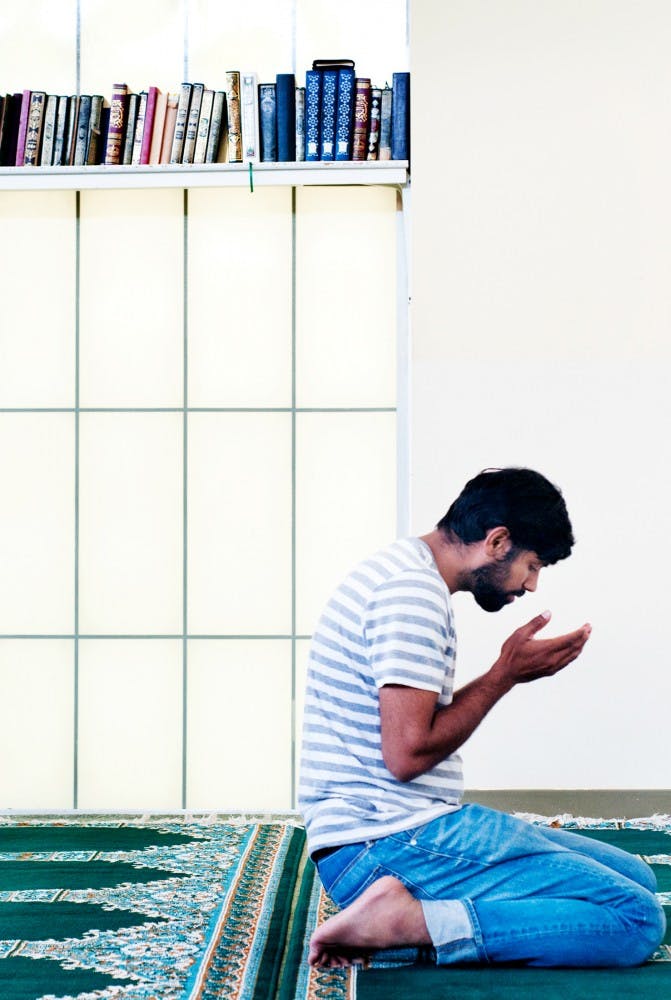Monday, Muslims around the world exchanged the phrase “Ramadan mubarak,” meaning “blessed Ramadan” in Arabic.
The new moon was sighted, which signals the start of Ramadan, the ninth month of the Islamic lunar calendar.

Chemical engineering graduate student Abu Hassan silently prays Monday afternoon at the Islamic Society of Greater Lansing. Monday marked the start of the Ramadan, a month long period of spirituality and fasting during daylight.
Monday, Muslims around the world exchanged the phrase “Ramadan mubarak,” meaning “blessed Ramadan” in Arabic.
The new moon was sighted, which signals the start of Ramadan, the ninth month of the Islamic lunar calendar.
These 30 days are considered to be the holiest in Islam as they commemorate the first revelations of the Quran, Islam’s sacred book.
Muslims observe this month by engaging in various religious and spiritual rituals, and among them is the mandatory fast from dawn until sunset every day of the month.
Because the lunar calendar is shorter than the western solar calendar, Ramadan is 10 days earlier every year making this year’s Ramadan the first in decades to fall entirely during the summer.
“You have to do a little more preparation,” graduate student Yamaan Saadeh said. “Make sure you’re well hydrated before you go to sleep and make the extra effort to stay out of the sun and conserve your energy.”
Fasting Muslims are required to abstain from eating, drinking, smoking and sex.
Withholding from those four things allows Muslims to reflect on other things, such as their higher purpose in life, Saadeh said.
Muslims are obligated to fast as an act of worship, physical and spiritual cleansing and solidarity with the poor among other reasons.
“It definitely will be a little more physically challenging,” Saadeh said. “It’s more rewarding though because you have to work harder throughout the day.”
Traditionally, breaking fast at the end of the day is done with dates and water and followed by a large meal.
Human biology junior Maidah Malik will be in class during the week when the sun sets, and she finally is able to eat.
“I’ll have to take food with me and break (fast) on my own instead of eating with my family,” she said.
Saadeh said the highlight of Ramadan comes at night when families and friends come together to break fast.
Assistant professor of computer engineering Muhannad Quwaider originally is from Jordan and has spent most of his Ramadans there.
Quwaider said the days here are much lengthier compared to those in Jordan, making fasting more difficult than what he’s used to.
“The most important thing is to eat the time before the sunrises. This meal, called suhoor, is very important,” he said. “The first few days will be the hardest days because people aren’t used to not eating for 15 hours.”
Graduate student Ahmad Moussa-Basha said it will be more difficult to adapt to fasting this year because of how long and hot the days are.
“I might be staying up pretty late, taking advantage of the time we can eat,” he said. “I plan on drinking and hydrating a lot, sleeping a lot and I’ll be working, which takes your mind off of things usually.”
Moussa-Basha said reading the Quran and making the effort to improve religious habits are significant factors of Ramadan.
Support student media! Please consider donating to The State News and help fund the future of journalism.
“It’s a tone-setter for the rest of the year,” he said. “It can be really uplifting if you want it to be and really hard if you want it to be.”